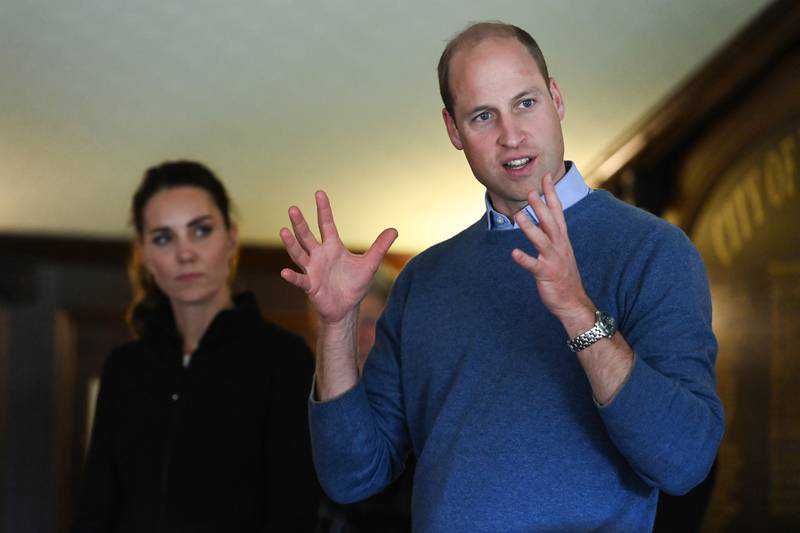UK's Prince William warns of 'environmental crisis’ facing planet
03 October, 2021

The UK's Duke of Cambridge has issued a warning about the “environmental crisis” engulfing the planet and the threat to its ecosystems, in a new documentary series for public service broadcaster the BBC.
Prince William highlights how humanity has created a world “at odds with the planet we live on” and urges action “for the sake of future generations”, in the five-part series that examines the environmental issues behind his Earthshot Prize.
His words are echoed by revered natural history broadcaster Sir David Attenborough, an Earthshot Prize judge, who narrates some of the programmes.
Mr Attenborough warns that humanity risks creating an “extinction event” like the demise of the dinosaurs.
The duke launched his ambitious prize to find solutions to the planet’s environmental problems and overcome the pessimism felt by many over its future.
In the documentary, he appears in dramatic UK landscapes, from mountains to the North Sea and an ancient, ruined village on the northern Orkney archipelago, as he illustrates his arguments.
Each documentary is devoted to one of five global problems adopted as Earthshot Prize categories: protect and restore nature; clean our air, revive our oceans; build a waste-free world; and fix our climate.
In the first episode of The Earthshot Prize: Repairing Our Planet, which screens in the UK on Sunday, William talks about his inspiration for the awards – US President John F Kennedy’s Moon landings, nicknamed “Moonshot”, which resulted in technological advances.
Standing beside water in the Norfolk countryside, in eastern England, on a moonlit night, William said: “In reaching for the Moon we found the Earth. For the first time we could see that the world we live on is finite and precious.
“Ultimately, it woke us to a distressing truth we are still trying to come to terms with – the modern world we have built is at odds with the planet we live on.
“It’s come to this, our planet is now in crisis, its delicately balanced systems are becoming more and more unstable with every passing year. So for the sake of future generations, let’s act now,” Prince William said.
“Let’s take inspiration from the Moonshot, and set ourselves a global challenge for this decade, a common goal to unite behind, to mend our broken relationship with our planet and build a better future for all.
“It’s for this very reason that I launched the Earthshot Prize, the most ambitious environmental prize in history. Each year, until 2030, we will award five £1 million prizes to those who we believe can transform our chances of repairing our planet within the decade.”
The programmes look at environmental problems across the globe. From the loss of rainforests in Borneo as palm oil estates have increased, to the destruction of the Amazon for cattle pasture, and how dams threaten marine wildlife and the fishing livelihoods of people along the Cambodian stretch of the Mekong river.
Mr Attenborough said: “Over the last 50 years, Borneo has lost 30 per cent of its tropical forests.
“The reason wild areas across the world are still being destroyed is simple, in today’s world a wild habitat brings less financial income than a cleared one.”
Solutions to problems are highlighted, from the rewilding of Knepp, a 3,500-acre estate in West Sussex, south-east England, where the once intensively farmed land has been given back to nature, to projects aimed at reducing land used in farming – a “cultured meat” initiative in Israel and innovative indoor produce growing in the Netherlands.
Wildlife habitat has been made profitable in Il Ngwesi in central Kenya, with community leader Kip Ole Polos describing how he and his peers own and run an eco-tourism lodge.
He told the documentary: “Wildlife brings us tourism, and tourism brings us jobs.”
Mr Attenborough has a stark warning.
“Humanity has left its mark on almost 95% of the Earth’s land surface. In the short period since 1970, the populations of mammals, birds, fish, reptiles and amphibians are thought to have declined on average by 60 per cent,” he said.
“We risk causing the biggest extinction event since the end of the dinosaurs 65 million years ago.”
The three finalists in each category are featured during the series and include a girl of 14 from India who has designed a solar-powered ironing cart, the government of Costa Rica, which has pioneered a project paying local citizens to restore natural ecosystems, and a Chinese app that allows its citizens to hold polluters to account.
The BBC series airs ahead of the UN Cop26 climate summit hosted in Glasgow from November 1
The Earthshot Prize winners will be announced on October 17.
Source: www.thenationalnews.com
TAG(s):
